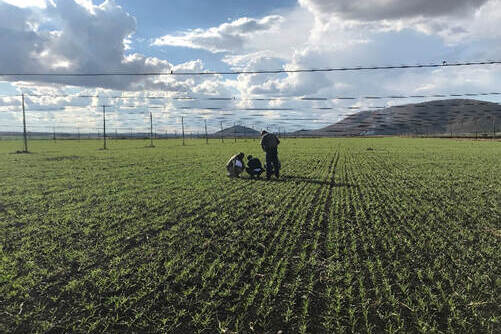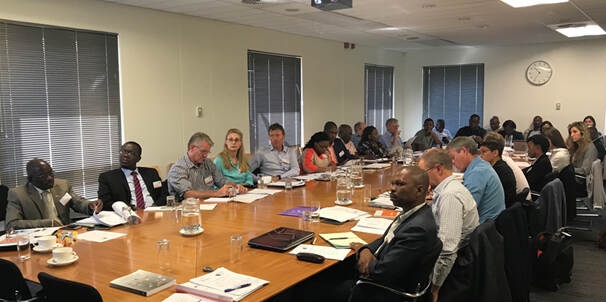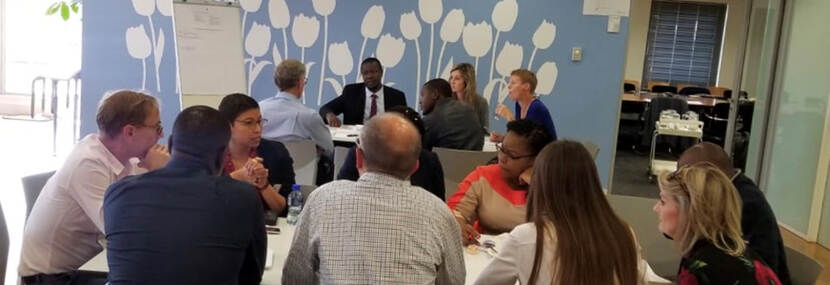Theory of Change for inclusive agricultural business partnerships in South Africa
On 29 August 2019 the Embassy of the Kingdom of the Netherlands organised a consultative roundtable discussion for its newly developed Theory of Change for inclusive agricultural businesses. The meeting was held at the Embassy’s office in Pretoria. The Theory of Change seeks to contribute in the transformation of the agricultural sector in South Africa, while at the same time, contributing in a meaningful and viable inclusive investment environment for the country. The Theory of Change emanates from lessons and best practices extracted from Dutch funded and other projects in South Africa.
Lessons from the big four projects
The Government of the Netherlands has supported numerous projects in the agricultural sector in South Africa with the aim to build a segment of emerging farmers that can contribute to transformation of the agricultural sector and food security in the country. While reaping reasonably good results, these projects have brought diverse experiences and insights for creating effective models for smallholder farmer support.
Recently the Embassy of the Kingdom of the Netherlands commissioned a study to assess at least 4 Dutch funded projects in order to extract lessons and best practices that can inform a Theory of Change and strategies to supporting smallholder farmers that demonstrate the potential to grow their primary production enterprises towards self-sustenance and commercialisation. Each of the assessed projects was designed and implemented in the form of inclusive business involving partnerships between domestic commercial partners and local cash crop, and market oriented, smallholder individuals and groups. The four projects that were assessed are: Heineken emerging barley farmers (BE-FED), Nwanedi New Generation Cooperative (NNGC), water footprint reduction of small-scale sugarcane growers (SSCGs) with TsGro, and the SPAR Rural Hub project.

Findings from the assessment have shown that the manner in which the supported smallholders are included in the value creation and appropriation processes is a potential indicator of the extent to which smallholders benefit from their value chain inclusion and if they are able to drive the transformation of the agricultural sector required in South Africa. In addition, for a smallholder support programme to be effective and sustainable, the value proposition to both the smallholder and the commercial firm must be attractive. Smallholder farmers that have entered into the contracts with commercial partners need to be assured that they can earn an income from their new value chain integration. Equally important for the smallholder support programme to succeed is that there is a business case for the commercial partner.
Theory of Change for the future
In order to achieve win-win results, a holistic inclusive business model incorporating open mindedness, flexibility and pragmatic approach is imperative. At the smallholder level, the model should seek to achieve the objectives of improving livelihoods, through increasing yields and prices, introducing higher value crops and expanding business scopes. This objective can be achieved through assessing and understanding the smallholder context and their challenges before entering into concrete business arrangements. Inputs and accompanying support services must therefore be informed by robust contextual analysis. For the commercial partners such a model should seek to achieve the objectives of identifying and strengthening business opportunities. Corporate social responsibility should not form primary justification for establishing inclusive business arrangements that seek to strengthen the smallholder. The model should practically build local supplier base, increase diversification of supplier base, fulfil B-BBBE requirements, and respond to land reform policies and aspirations. Thus initial assessment for the establishment of relevant partnerships should seek to answer the question about the potential business case for the identified commercial partners.
Some observations from the Roundtable discussion have confirmed the main propositions from the Theory of Change. They have added that the model should incorporate the business case for the financiers, as their contribution is crucial for success. Business case imperatives should be transparently and collaboratively identified and pursued, right from programme design phase. Using diversification approaches this should include efforts to support smallholders to earn income while farming. Additional support should include infrastructure for production and value-chain management and related capacity development for the partners involved.

Based on these observations, the drafted Theory of Change suggests the following steps for developing effective win-win inclusive business programmes between smallholders and commercial players:
- Define the project objectives and draw up the business and social impact case
- Design the broad business model, the instruments to be used, and the partners needed
- Identify financing methods of the project
- On-the-ground, conduct local value chain analysis, and smallholder livelihood assessment
- Fine-tune business model and draw up contracts, secure hardware & infrastructure, contract external partners (e.g. mentors, suppliers)
- Implement pilot, evaluation and adapt model where necessary
- Scale and exit
These steps are extensively explained and illustrated upon in the Theory of Change document which is to be disseminated soon by the Embassy of the Kingdom of the Netherlands. The Embassy will use the draft Theory of Change and the input from the Roundtable discussion to disseminate the final Theory of Change in and through accessible formats and media channels.

Farming the Future: New Dutch Agricultural Policy
In 2018, under the motto, Farming the Future, the Government of the Netherlands released its new agricultural policy designed around circular economy ideals. This policy emphasises sharing of benefits and profit among players across the value chain while, at the same time, seeking to contribute in the Global Sustainable Goals. The proposed Theory of Change is partly guided by this new policy.
More information
More information and stories on the agricultural initiatives of the Dutch Government in South Africa can be found on this web site: https://www.agroberichtenbuitenland.nl/landeninformatie/zuid-afrika